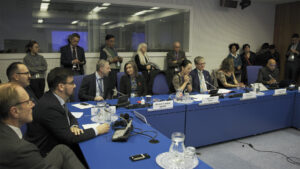We filmed this session at the 4th European Harm Reduction Conference in Bucharest, Romania, where professionals and activists discussed the contribution of civil society to improve access to harm reduction programs in Europe.
JAMIE BRIDGE (International Drug Policy Consortium, UK): The Civil Society Task Force on Drugs (CSTF): Getting Our Voices Heard Within the United Nations
In 2009, the governments of the world reached consensus on a Political Declaration and Plan of Action on drug policies for the next decade – setting targets to “eliminate or significantly reduce” the “world drug problem” by 2019. That target date is fast approaching, and a High-Level Ministerial Segment will be held in Vienna in March 2019 to discuss the progress (or lack of it), and lay the path for the next ten years. The Civil Society Task Force on Drugs (CSTF) is a joint initiative of the Vienna and New York NGO Committees on Drugs. Following an open call and selection process, the CSTF comprises 35 individuals from around the world – representing regions, affected populations and global issues such as harm reduction.
SAM SHIRLEY-BEAVEN (Harm Reduction International, UK): Findings from the Global State of Harm Reduction 2018: A Focus on Western Europe
Global State of Harm Reduction 2018 details updated information on harm reduction services across the globe, including needle and syringe programmes (NSP) and opioid substitution treatment (OST); harm reduction services in the prison setting; harm reduction for amphetamine-type stimulants (ATS) and new psychoactive substances (NPS); access to antiretroviral therapy for people who inject drugs; regional overdose responses; policy developments; civil society developments; and information relating to funding.
INGO ILJA MICHELS (Institute on Addiction Research, Germany) WHO/UNODC International Standards of Treatment of Drug Use Disorders and its implementation in Central Asia on the basis oft he Central Asia Drug Action Programme (CADAP)
At the UN General Assembly on World Drug Issues (UNGASS) in New York from 19 to 21 April 2016, a final declaration was adopted on the first day, which had already been pre-negotiated by the UN Commission on Narcotic Drugs (CND) in Vienna in March 2016 Compromise of a difficult and lengthy negotiation process. There are undoubtedly a number of progressive elements in the Final Declaration: health policy measures are in the foreground and support for harm reduction measures (though the term itself has remained controversial and could not be enshrined in the document), the promotion of alternative development and strong language on human rights, as well as an explicit demand for the proportionality of punishments. The statement also addresses new challenges such as New Psychoactive Substances and Internet Trade. An ever-widening consensus has emerged that drug policy can be seen more strongly than hitherto as a health policy. Also new is that “drug treatment”, meaning opiate substitution treatment, is part of a document borne by all Member States.
PETER SAROSI (Rights Reporter Foundation, Hungary): Harm Reduction in the EU: From the Perspective of Civil Society
The Civil Society Forum on Drugs (CSFD), an expert group of the EU Commission, published a report assessing civil society perspectives on the implementation of the EU Action Plan on Drugs (2017-20). The report is based on the findings of a survey completed by 169 civil society organisations working on the ground, from 32 European countries. The report shows disturbing gaps and barriers in accessing harm reduction services in many member states, especially among vulnerable groups. In the Eastern part of the EU, there is crisis for harm reduction due to the changing funding and political environment.
Video: Istvan Gabor Takacs





